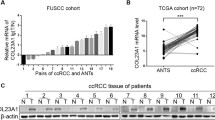Abstract
Cullin1 (Cul1) is a scaffold protein of the ubiquitin E3 ligase Skp1/Cullin1/Rbx1/F-box protein complex, which ubiquitinates a broad range of proteins involved in cell-cycle progression, signal transduction, and transcription. To investigate the role of Cul1 in the development of renal cell carcinoma (RCC), we evaluated the Cul1 expression by immunohistochemistry using a tissue microarray (TMA) containing 307 cases of RCC tissues and 34 normal renal tissues. The Cul1 expression was increased significantly in RCC and was correlated with renal carcinoma histology grade (P = 0.007), tumor size (P = 0.013), and pT status (P = 0.023). Also, we found that silencing of Cul1 leads to increased expression of p21 and p27 that could inhibit the cyclin D1 and cyclin E2 expressions and arrest cell cycle at the G1 phase. Furthermore, knockdown of Cul1 inhibits RCC cell migration and invasion abilities by up-regulating the expression of TIMP-1 which could inhibit the expression of MMP-9. Finally, using bioluminescence imaging, we found that Cul1 knockdown significantly reduced the tumor growth in vivo. Cul1 may constitute a potential therapeutic target in RCC.





Similar content being viewed by others
References
Siegel R, Miller K, Jemal A. Cancer statistics, 2015. CA Cancer J Clin. 2015;65(1):5–29.
Spano D, Zollo M. Tumor microenvironment: a main actor in the metastasis process. Clin Exp Metastasis. 2012;29(4):381–95. doi:10.1007/s10585-012-9457-5.
Steeg PS. Tumor metastasis: mechanistic insights and clinical challenges. Nat Med. 2006;12(8):895–904. doi:10.1038/nm1469.
Chondrogianni N, Gonos ES. Structure and function of the ubiquitin-proteasome system: modulation of components. Prog Mol Biol Transl Sci. 2012;109:41–74. doi:10.1016/b978-0-12-397863-9.00002-x.
Sun Y. E3 ubiquitin ligases as cancer targets and biomarkers. Neoplasia. 2006;8(8):645–54. doi:10.1593/neo.06376.
Burrows AC, Prokop J, Summers MK. Skp1-Cul1-F-box ubiquitin ligase (SCFβTrCP)-mediated destruction of the ubiquitin-specific protease USP37 during G2-phase promotes mitotic entry. J Biol Chem. 2012;287(46):39021–9.
Hershko A, Ciechanover A. The ubiquitin system. Annu Rev Biochem. 1998;67:425–79. doi:10.1146/annurev.biochem.67.1.425.
Sarikas A, Hartmann T, Pan ZQ. The cullin protein family. Genome Biol. 2011;12(4):220.
Bai J, Yong HM, Chen FF, Mei PJ, Liu H, Li C, et al. Cullin1 is a novel marker of poor prognosis and a potential therapeutic target in human breast cancer. Ann Oncol: Off J Eur Soc Med Oncol/ESMO. 2013;24(8):2016–22. doi:10.1093/annonc/mdt147.
Bai J, Zhou Y, Chen G, Zeng J, Ding J, Tan Y, et al. Overexpression of Cullin1 is associated with poor prognosis of patients with gastric cancer. Hum Pathol. 2011;42(3):375–83. doi:10.1016/j.humpath.2010.09.003.
Liu W, Wang Y, Zhang C, Huang B, Bai J, Tian L. Cullin1 is up-regulated and associated with poor patients’ survival in hepatocellular carcinoma. Int J Clin Exp Pathol. 2015;8(4):4001–7.
Capitanio U, Montorsi F. Renal cancer. Lancet (London, England). 2015. doi:10.1016/s0140-6736(15)00046-x.
Li. Increased Cul1 expression promotes melanoma cell proliferation through regulating p27 expression. Int J Oncol. 2010;37(5). doi:10.3892/ijo_00000786.
Haitel A, Wiener HG, Neudert B, Marberger M, Susani M. Expression of the cell cycle proteins p21, p27, and pRb in clear cell renal cell carcinoma and their prognostic significance. Urology. 2001;58(3):477–81.
Langner C, von Wasielewski R, Ratschek M, Rehak P, Zigeuner R. Biological significance of p27 and Skp2 expression in renal cell carcinoma. A systematic analysis of primary and metastatic tumour tissues using a tissue microarray technique. Virchows Archiv: Int J Pathol. 2004;445(6):631–6. doi:10.1007/s00428-004-1121-2.
Migita T, Oda Y, Naito S, Tsuneyoshi M. Low expression of p27(Kip1) is associated with tumor size and poor prognosis in patients with renal cell carcinoma. Cancer. 2002;94(4):973–9.
O’Hagan RC, Ohh M, David G, de Alboran IM, Alt FW, Kaelin Jr WG, et al. Myc-enhanced expression of Cul1 promotes ubiquitin-dependent proteolysis and cell cycle progression. Genes Dev. 2000;14(17):2185–91.
Yang X, Menon S, Lykke-Andersen K, Tsuge T, Di X, Wang X, et al. The COP9 signalosome inhibits p27(kip1) degradation and impedes G1-S phase progression via deneddylation of SCF Cul1. Curr Biol: CB. 2002;12(8):667–72.
Lu H, Cao X, Zhang H, Sun G, Fan G, Chen L, et al. Imbalance between MMP-2, 9 and TIMP-1 promote the invasion and metastasis of renal cell carcinoma via SKP2 signaling pathways. Tumour Biol: J Int Soc Oncodev Biol Med. 2014;35(10):9807–13. doi:10.1007/s13277-014-2256-7.
Sato A, Nagase H, Obinata D, Fujiwara K, Fukuda N, Soma M, et al. Inhibition of MMP-9 using a pyrrole-imidazole polyamide reduces cell invasion in renal cell carcinoma. Int J Oncol. 2013;43(5):1441–6.
Sato A, Nagase H, Obinata D, Fujiwara K, Fukuda N, Soma M, et al. Inhibition of MMP-9 using a pyrrole-imidazole polyamide reduces cell invasion in renal cell carcinoma. Int J Oncol. 2013;43(5):1441–6. doi:10.3892/ijo.2013.2073.
Moore CS, Crocker SJ. An alternate perspective on the roles of TIMPs and MMPs in pathology. Am J Pathol. 2012;180(1):12–6. doi:10.1016/j.ajpath.2011.09.008.
Uehara N, Yoshizawa K, Tsubura A. Vorinostat enhances protein stability of p27 and p21 through negative regulation of Skp2 and Cks1 in human breast cancer cells. Oncol Rep. 2012;28(1):105–10. doi:10.3892/or.2012.1758.
Acknowledgments
This project is supported by grants from the National Natural Science Foundation of China (No. 81472663); the Education Department of Jiangsu Province (No. 15KJA320006); the “Qing Lan Project”, the “333 Project” (BRA2014354), and the “Six Talent Peaks Project” of Jiangsu Province.
Author information
Authors and Affiliations
Corresponding authors
Ethics declarations
Ethics statement
This study was performed under a protocol approved by the Institutional Review Boards of the Affiliated Hospital of Xuzhou Medical College, and all examinations were performed after obtaining written informed consents. All experiments involving human subjects were performed in accordance with relevant guidelines and regulations.
Conflicts of interest
None
Rights and permissions
About this article
Cite this article
Ping, JG., Wang, F., Pu, JX. et al. The expression of Cullin1 is increased in renal cell carcinoma and promotes cancer cell proliferation, migration, and invasion. Tumor Biol. 37, 12823–12831 (2016). https://doi.org/10.1007/s13277-016-5151-6
Received:
Accepted:
Published:
Issue Date:
DOI: https://doi.org/10.1007/s13277-016-5151-6




